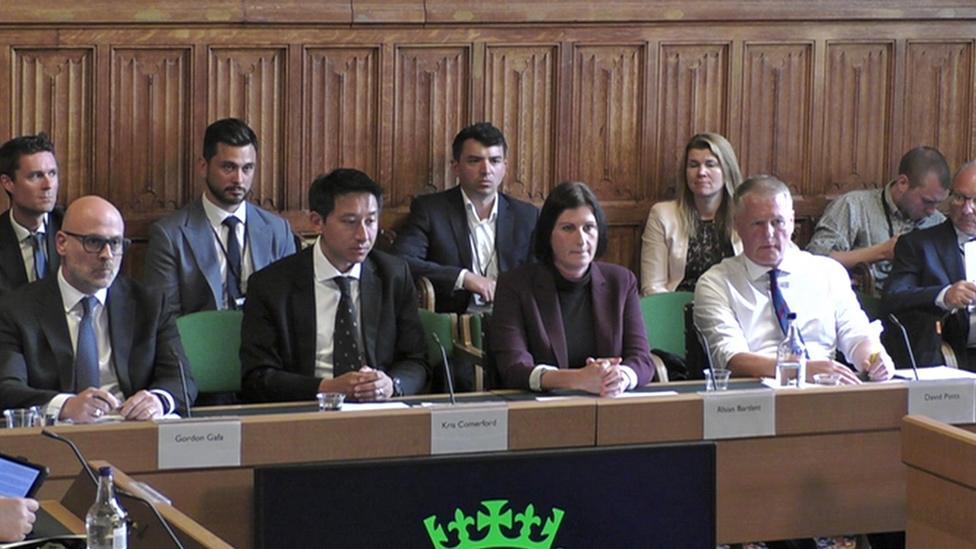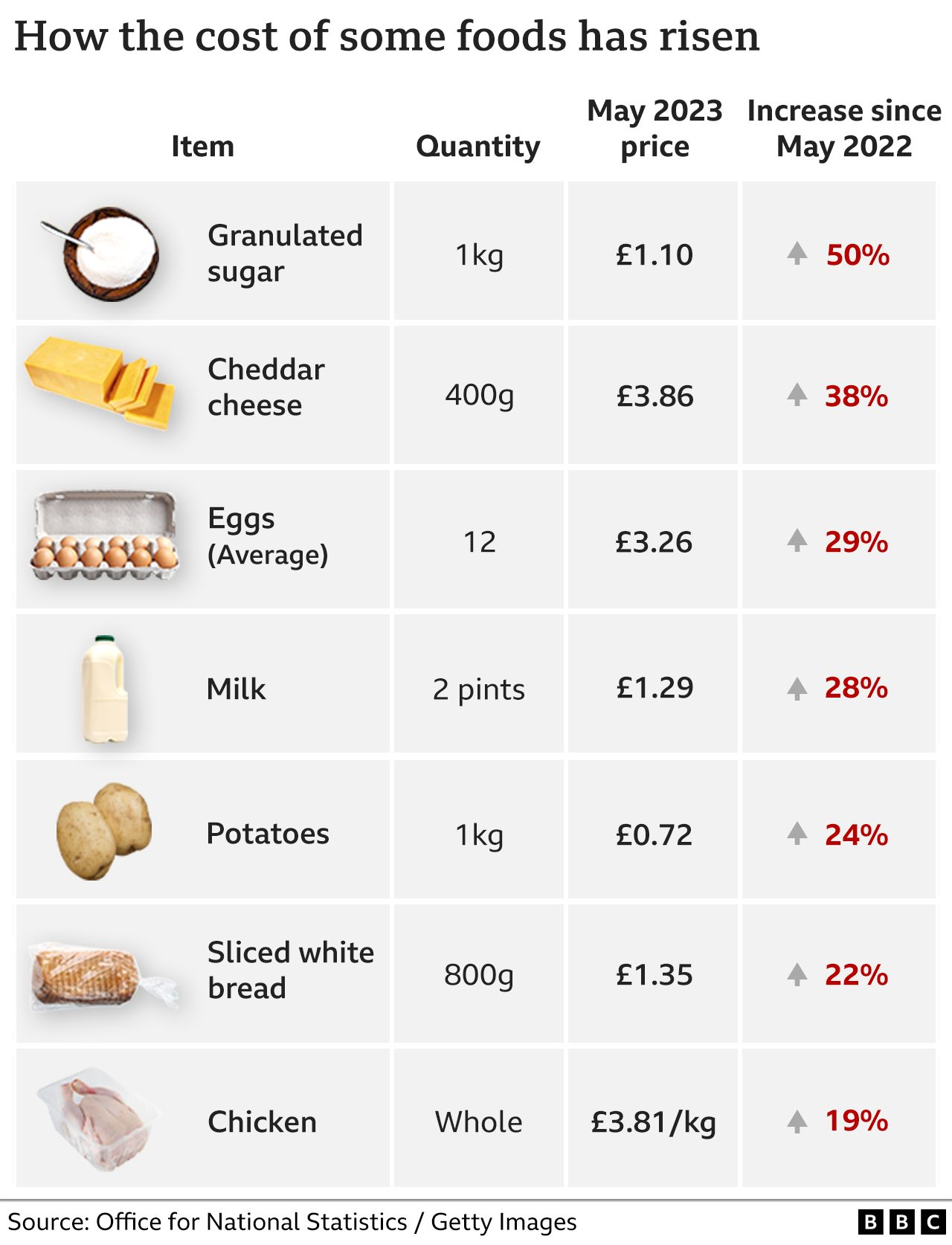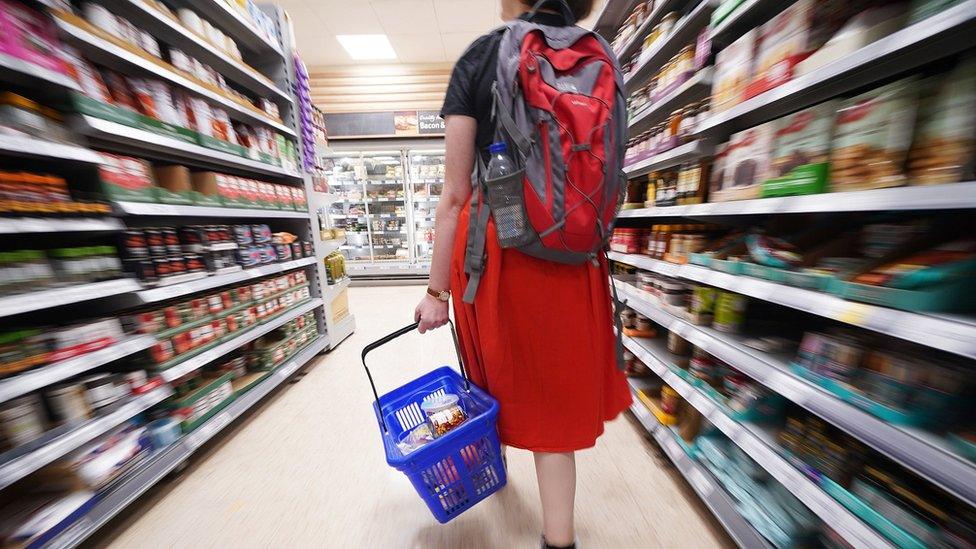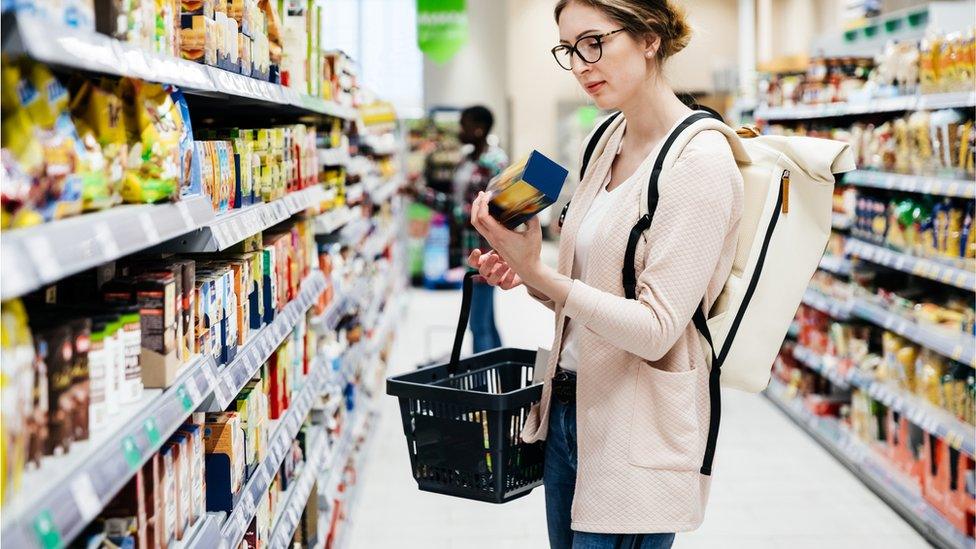Tesco, Sainsbury's and rivals say they are not making too much money
- Published
- comments

L-R Gordon Gafa, Tesco, Kris Comerford, Asda, Rhian Bartlett, Sainsbury's, and David Potts, Morrisons
Supermarket executives have denied making too much money from soaring prices, telling MPs the industry is the "most competitive we have ever been".
Bosses from Tesco, Sainsbury's, Asda and Morrisons were grilled over high food and fuel prices.
The supermarkets rejected claims of making excess profits and said they were shielding customers from the full impact of rising costs.
The competition watchdog is looking into the level of food and fuel prices.
It is examining whether not enough competition has meant customers are overpaying.
Supermarket executives were quizzed by MPs on the Business and Trade Committee on Tuesday on why food prices were still rising, despite some wholesale costs falling.
Food prices rose by 14.6% in the year to June, according to the British Retail Consortium (BRC), which represents supermarkets. That was down from 15.4% in the year to May, but it does not mean prices are falling, just that they are rising at a slower pace.
Higher grocery prices remain a key reason why the overall rate of inflation in the UK remains stubbornly high.
Chairman Darren Jones said that all four supermarkets, with the exception of Morrisons, had made increased profits compared to before the Covid pandemic.
Mr Jones said he had heard of Asda employees recently "having to go to the food bank to collect donations of food they had stacked in their own supermarket because they cannot make ends meet".
But the supermarkets said they all paid the National Living Wage or above and argued they were doing all they could to protect customers from higher costs resulting from increased energy, labour and commodity prices.
Jane Hunt, a Conservative MP, asked executives if they were "in fact a cartel" and were colluding to set prices.
In response, Kris Comerford, chief commercial officer for Asda, said UK retail was "the most competitive market", a sentiment echoed by executives from Sainsbury's and Tesco.
All four supermarket bosses said they did not support a price cap on essential foods, an idea which had been considered by the government, but was never formally proposed.
Politicians, trades unionists and the governor of the Bank of England have all questioned why supermarket prices have not fallen as rapidly as the wholesale cost of ingredients such as wheat.
Some have suggested that retailers might be failing to pass on savings and are banking the profit instead.
Supermarkets have previously said they have cut prices when possible and added that falls in wholesale costs take time, typically three to nine months, to filter through to the shelves.
Helen Dickinson, head of the BRC, said the trade body expected food inflation to drop "to single digits later this year".

Most of the big chains have recently introduced price cuts to staples, with Sainsbury's on Monday the latest to announce it was investing £15m to reduce the cost of basics such as rice, pasta and chicken.
However, some items such as milk and eggs remain relatively expensive compared to pre-Covid prices.
Jamie Keeble, co-founder of sausage and burger maker Heck which supplies most of the major supermarkets, told the BBC's Today programme that the price of pork was expected to remain high for the next 18 months.
He said the only way supermarkets could lower their prices was by asking suppliers to cut costs, but he added: "We're certainly not in the position to start giving cost decreases on our products.
"At the end of the day, [the supermarkets] are going to have to take a cut in their margins if they really want to lower the prices on the shelf, that's the only way to do it."
Separately, all four supermarket executives backed calls for more transparency on fuel prices, after MPs highlighted that prices for petrol and diesel were lower in Northern Ireland as a result of data being shared widely with drivers.
A study by academics , externalat the London School of Economics last month found nearly a third of food price inflation since 2019 was due to Brexit.

How is the price of food changing your diet? You can share your experiences by emailing haveyoursay@bbc.co.uk, external.
Please include a contact number if you are willing to speak to a BBC journalist. You can also get in touch in the following ways:
WhatsApp: +44 7756 165803
Tweet: @BBC_HaveYourSay, external
Please read our terms & conditions and privacy policy
If you are reading this page and can't see the form you will need to visit the mobile version of the BBC website to submit your question or comment or you can email us at HaveYourSay@bbc.co.uk, external. Please include your name, age and location with any submission.
- Published16 June 2023

- Published19 June 2023
